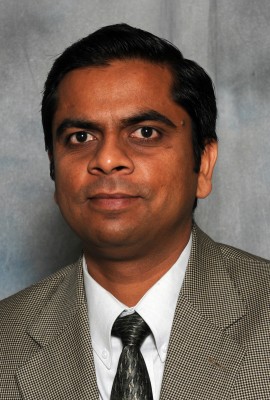Pitt-Brad Professor to Research Cures for Cystic Fibrosis, Cancer, Safer Biofuel
 BRADFORD, Pa. – Dr. Om V. Singh, an assistant professor of biology, has been spending his time outside the classroom in the lab studying the tiniest building blocks of life and hoping to shed light on possible applications for cystic fibrosis patients, cancer research, microbial toxicity and biofuels.
BRADFORD, Pa. – Dr. Om V. Singh, an assistant professor of biology, has been spending his time outside the classroom in the lab studying the tiniest building blocks of life and hoping to shed light on possible applications for cystic fibrosis patients, cancer research, microbial toxicity and biofuels.
One area of his research focuses on proteomics, the study of proteins that make up living structures. Much of Singh’s work in this area was done when he was a visiting professor and visiting scientist at The Johns Hopkins University, where he has spent the last two summers in the lab conducting cystic fibrosis research.
Cystic fibrosis, Singh explained, is caused by a protein that is created in a way that does not allow it to carry out its regular biological function. Since genes write the blueprint for how proteins are created, researchers have explored the option of trying to replace the defective code gene through gene therapy, but with little success so far.
“Genes are like the root of a tree, but proteins are the stem and leaves,” Singh explained. With little success on the genetic side, researchers like Singh are now attacking the problem from the protein side. One of the first steps is identifying the proteins that should be targeted by drug therapy for the most effective results. Identifying the proteins is a high-tech operation that is very labor intensive, Singh explains. It can take months to identify functional protein, and there are thousands to identify.
Singh has been working as part of a research team advising graduate and undergraduate students who are working to identify the proteins that will best respond to drug therapy. As part of his work at Johns Hopkins this summer, Singh also served as guest editor of the journal Expert Review of Proteomics.
Cystic fibrosis research is just one of many areas using proteomics; another is cancer research, in which Singh has also been involved in collaboration with Johns Hopkins and Vanderbilt University School of Medicine in Nashville, Tenn. The work was conducted in graduate settings because the equipment necessary for the work is not found at the undergraduate level.
That’s not so for one of Singh’s other areas of specialty, extremophiles or extreme microbes, which he’s studying at Pitt-Bradford with the help of post-baccalaureate student Erin Copeland and Prashant Gabani, a biology major from Bridgeville.
Singh has focused some of his research in this area on the production of biofuels, where microbes can be used instead of chemicals for certain steps in the process.
“Biofuels is the area where we are all looking ahead,” he said, but there are not many labs exploring the use of microbes to make biofuel production more efficient.
Some microbes that can help in that process have been identified, but Singh is looking for microbes that can perform under extreme temperatures.
“That’s the place that my research starts,” he said. Some of his views were published in 2010 in a book he edited with Dr. Steven P. Harvey, “Sustainable Biotechnology: Sources of Renewable Energy.”
Cold-resistant microbes could also have anti-freeze applications for industry or military units working in cold or high-altitude situations.
A second group of extremophiles that intrigue Singh are those that are resistant to ultraviolet radiation.
Having identified microbes that are resistant to ultraviolet radiation with the help of Gabani, he and Copeland will now take on the task of determining what is different in the protein profile of the UV-resistant microbes.
Singh said finding the UV-resistant protein profile could help prevent skin cancer.
Singh has also been concerned with foodborne illnesses caused by pathogenic micro-organisms in the food that produce a variety of toxins.
It is extremely difficult to detect specific microbes and the toxins microbes produce in contaminated food, he explained.
Singh said, “Industries and regulatory agencies rely on conventional methods to detect microbes and their toxins, which cannot always distinguish whether microbes are viable or non-viable.”
In a book chapter recently published in the “Handbook of Systems Toxicology,” Singh argued that new systems biology-based approaches are the best fit to detect foodborne microbial toxins. Gabani is listed as a co-author of the chapter.
In the midst of his intense microbe and proteomics research, Singh has also taken on the larger issues of regulation and ethics, publishing articles on patent infringement and pharmaceutical drug development and genetically engineered food in RAJ Pharma, Pharmaceutical Technology and Studies in Ethics, Law and Technology journals.
This summer, Singh will take his research to Brazil, where he will promote biofuel research as a visiting professor at the Universidad de São Paulo, and to Germany, where he will serve as a visiting scholar. He is also intending to deliver invited guest lectures at the Institute of Nuclear Medicine and Allied Sciences in New Delhi, India.
